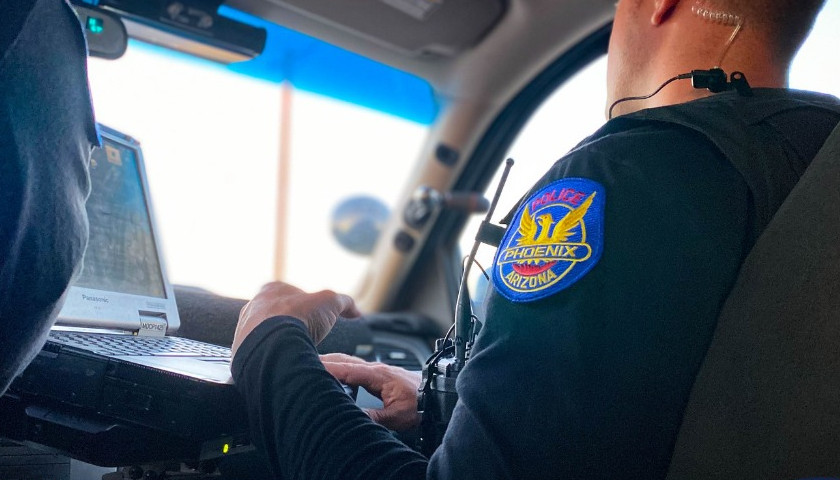The Phoenix Police Department (PPD) proposed a new limit of force policy focusing on de-escalation, which it intends to adopt after seeking public comment. The public can comment on the proposed changes through January 31.
The proposed policy, announced under Interim Police Chief Michael Sullivan, revises how and when officers can use force during confrontations and arrests. The section on de-escalation states that law enforcement shall use those techniques whenever possible. De-escalation includes “verbal persuasion, commands, and warnings,” “…waiting,” “using barriers,” creating distance… [from] …the threat,” “withdraw from the scene,” and using “behavior health care providers.”
The policy says “when employees use force, they shall exercise the utmost restraint.” If others use “inappropriate” use of force and an officer fails to intervene, they may be subject to disciplinary action. They are not to “use tactics that unnecessarily escalate an encounter or create the need for force.” Also, they are required to identify themselves if possible.
The use of force must be “reasonable,” a standard that has drawn objections from other police unions. The Albuquerque Police Officers’ Association objected to that language when it was implemented there in 2020, stating it was vague, undefined, and difficult to determine what facts “a reasonable officer” would have known. A judge overruled the objection, stating that he could only amend the use-of-force policy if it violated the constitution, federal law or the court-approved settlement agreement between the city and the DOJ.
The chokehold, named the Carotid Control Technique, was discontinued in June 2020.
According to a Phoenix Police officer who preferred not to be identified, the policy is modeled after one adopted by the Baltimore Police Department (BPD), which was implemented due to a consent decree signed with the Department of Justice (DOJ). The DOJ required widespread reforms after the death of Freddy Brown in police custody. Baltimore Police Commissioner Michael Harrison said at the time, “This is a major cultural shift for our police department.” Sullivan came from BPD, where he was the deputy commissioner of BPD’s compliance bureau.
After Joe Biden became president, the DOJ started investigating police conduct in Minneapolis, Louisville, Kentucky, and Phoenix. The new approach to seeking racial justice marked a shift from the Trump administration. The DOJ announced it was investigating PPD in August 2021, citing five alleged problem areas. They were excessive and deadly force, possible retaliation against protesters and journalists, possible discriminatory policing, police compliance with the Americans with Disabilities Act, and potential rights violations of people experiencing homelessness.
Democrat Phoenix Mayor Kate Gallego welcomed the investigation, stating, “Comprehensive reform of policing in the city of Phoenix has been my priority since the first day I took office.”
The anonymous PPD officer told The Arizona Sun Times that he believes the department will cave in and agree to a consent decree with the DOJ, even though he doesn’t think it is justified.
PLEA published an article in August 2021 by Arizona Republic columnist Robert Robb critical of the DOJ’s investigation. “This DOJ ‘investigation’ is a perversion of federal law,” he said. “It isn’t truly intended to remedy constitutional or federal civil rights violations. It is to tip the balance of the political debate about policing in general in a particular direction and move the decision-making outside the local democratic process.” Robb pointed out that PPD “doesn’t habitually violate the Constitution or federal civil rights laws.”
Assaults using a weapon on police officers have increased by nearly 30 percent since 2011. In 2011, there were 878 in Phoenix. In 2021, there were 1,127. Violent crime generally has been increasing. PLEA reported in March 2022 that over the past decade, the number of homicides has increased by 61%, rapes have increased by more than 100 percent, and aggravated assaults have gone up by 120 percent.
– – –
Rachel Alexander is a reporter at The Arizona Sun Times and The Star News Network. Follow Rachel on Twitter. Email tips to [email protected].
Photo “Phoenix Police Department” by Phoenix Police Department.





